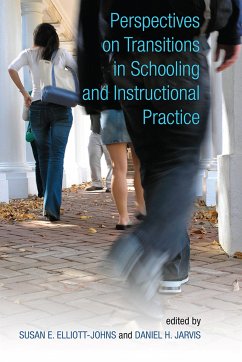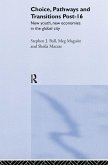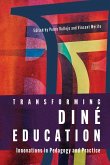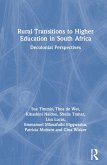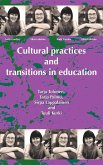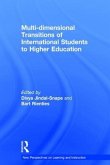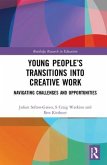Perspectives on Transitions in Schooling and Instructional Practice
Herausgeber: Elliott-Johns, Susan E; Jarvis, Daniel H
Perspectives on Transitions in Schooling and Instructional Practice
Herausgeber: Elliott-Johns, Susan E; Jarvis, Daniel H
- Gebundenes Buch
- Merkliste
- Auf die Merkliste
- Bewerten Bewerten
- Teilen
- Produkt teilen
- Produkterinnerung
- Produkterinnerung
Perspectives on Transitions in Schooling and Instructional Practice examines student transitions between major levels of schooling, teacher transitions in instructional practice, and the intersection of these two significant themes in education research. Twenty-six leading international experts offer meaningful insights on current pedagogical practices, obstacles to effective transitions, and proven strategies for stakeholders involved in supporting students in transition. The book is divided into four sections, representing the four main transitions in formal schooling: Early Years (Home,…mehr
Andere Kunden interessierten sich auch für
![Choice, Pathways and Transitions Post-16 Choice, Pathways and Transitions Post-16]() Stephen BallChoice, Pathways and Transitions Post-16264,99 €
Stephen BallChoice, Pathways and Transitions Post-16264,99 €![Educational Transitions Educational Transitions]() Educational Transitions220,99 €
Educational Transitions220,99 €![Transforming Diné Education: Innovations in Pedagogy and Practice Transforming Diné Education: Innovations in Pedagogy and Practice]() Transforming Diné Education: Innovations in Pedagogy and Practice116,99 €
Transforming Diné Education: Innovations in Pedagogy and Practice116,99 €![Rural Transitions to Higher Education in South Africa Rural Transitions to Higher Education in South Africa]() Sue TimmisRural Transitions to Higher Education in South Africa198,99 €
Sue TimmisRural Transitions to Higher Education in South Africa198,99 €![Cultural Practices and Transitions in Education Cultural Practices and Transitions in Education]() Cultural Practices and Transitions in Education61,99 €
Cultural Practices and Transitions in Education61,99 €![Multi-dimensional Transitions of International Students to Higher Education Multi-dimensional Transitions of International Students to Higher Education]() Multi-dimensional Transitions of International Students to Higher Education231,99 €
Multi-dimensional Transitions of International Students to Higher Education231,99 €![Young People's Transitions into Creative Work Young People's Transitions into Creative Work]() Julian Sefton-GreenYoung People's Transitions into Creative Work198,99 €
Julian Sefton-GreenYoung People's Transitions into Creative Work198,99 €-
-
-
Perspectives on Transitions in Schooling and Instructional Practice examines student transitions between major levels of schooling, teacher transitions in instructional practice, and the intersection of these two significant themes in education research. Twenty-six leading international experts offer meaningful insights on current pedagogical practices, obstacles to effective transitions, and proven strategies for stakeholders involved in supporting students in transition. The book is divided into four sections, representing the four main transitions in formal schooling: Early Years (Home, Pre-school, and Kindergarten) to Early Elementary (Grades 1–3); Early Elementary to Late Elementary (Grades 4–8); Late Elementary to Secondary (Grades 9–12); and Secondary to Post-Secondary (College and University). A coda draws together over-arching themes from throughout the text to provide recommendations and a visual model that captures their interactions. Combining theoretical approaches with practical examples of school-based initiatives, this book will appeal to those involved in supporting either the student experience (both academically and emotionally) or teacher professional learning and growth.
Hinweis: Dieser Artikel kann nur an eine deutsche Lieferadresse ausgeliefert werden.
Hinweis: Dieser Artikel kann nur an eine deutsche Lieferadresse ausgeliefert werden.
Produktdetails
- Produktdetails
- Verlag: University of Toronto Press
- Seitenzahl: 552
- Erscheinungstermin: 8. November 2013
- Englisch
- Abmessung: 226mm x 155mm x 33mm
- Gewicht: 816g
- ISBN-13: 9781442647046
- ISBN-10: 1442647043
- Artikelnr.: 38147257
- Herstellerkennzeichnung
- Libri GmbH
- Europaallee 1
- 36244 Bad Hersfeld
- gpsr@libri.de
- Verlag: University of Toronto Press
- Seitenzahl: 552
- Erscheinungstermin: 8. November 2013
- Englisch
- Abmessung: 226mm x 155mm x 33mm
- Gewicht: 816g
- ISBN-13: 9781442647046
- ISBN-10: 1442647043
- Artikelnr.: 38147257
- Herstellerkennzeichnung
- Libri GmbH
- Europaallee 1
- 36244 Bad Hersfeld
- gpsr@libri.de
Edited by Susan E. Elliott-Johns and Daniel H. Jarvis
Acknowledgements
List of Figures
List of Tables
About the Contributors
Introduction
Susan E. Elliott-Johns (Nipissing University, Schulich School of Education)
and Daniel H. Jarvis (Nipissing University, Schulich School of Education)
Part I: Early Years (Home/Pre-school/Kindergarten) to Early Elementary
(Grades 1–3)
1. Successful Transitioning to a Full-Day Early Learning Kindergarten
Program in Ontario: The Principal is Pivotal
Maria Cantalini-Williams (Nipissing University, Schulich School of
Education) and Leslie Telfer (Superintendent Of Education:Brant Haldimand
Norfolk Catholic District School Board)
2. Transition to the First Year of School in Singapore
Lay See Yeo (National Institute of Education Singapore, Psychological
Studies)
3. Young Children’s Experience of Starting School in an Area of
Socio-Economic Disadvantage
Amber Jackson (Griffith University, School of Human Services and Social
Work) and Jennifer Cartmel (Griffith University, School of Human Services
and Social Work)
4. “Ready Together–Transition to School” Program: Effecting Positive
Outcomes for Children, their Families, Schools, and the Community
Michele Binstadt (Creche & Kindergarten College)
Part II: Early Elementary (Grades 1–3) to Late Elementary (Grades 4–8)
5. The Other Primary Transition: How Educators Promote Optimal Transitions
during Elementary School
Patrick Akos (University of North Carolina, School of Education) and Kelsey
Augst Felton (School Counselor, Hilburn Drive Academy North Carolina)
6. Teachers’ Voices on Transitions in Classroom Reading Instruction
Susan E. Elliott-Johns (Nipissing University, Schulich School of Education)
7. Scaffolded LiteracyAssessment and a Model for Teachers’ Professional
Development
Lyn Sharratt (OISE/University of Toronto, Theory and Policy Studies)
8. Transitions in Elementary Mathematics Instruction
Marian Small (International Professional Development Consultant for
Improved Mathematics Education)
9. Fostering the Transition to Effective Teaching Practices in Inclusive
Classrooms
Anne Jordan (OISE/University of Toronto)
Part III: Late Elementary (Grades 4–8) to Secondary (Grades 9–12)
10. Supporting Students in the Transition to High School: The Role of
Self-Regulated Learning
Dawn Buzza (Wilfrid Laurier, Education)
11. Stakeholder Perceptions Associated with the Transition of Students from
Eighth Grade to High School
Karen Choate (Roosevelt University, Educational Leadership), Gregory M.
Hauser (Roosevelt University, Educational Leadership), and Thomas P. Thomas
(Roosevelt University, Secondary Education)
12. Establishing Successful Transitions for Intermediate Students
Gianna Helling (Principal at Toronto Catholic District School Board)
13. Exploring a “Family of Schools” Model for Cross-Panel Mathematics
Teacher Professional Development
Daniel H. Jarvis (Nipissing University, Schulich School of Education)
14. The Visual Turn: Transitioning into Visual Approaches to Literacy
Education
Maureen Kendrick (University of British Columbia, Language and Literacy
Education) and Jennifer Rowsell (Brock University, Teacher Education)
15. Transitioning to Being Bilingual: Examining the Linguistic and
Non-Linguistic Effects of Brief Bilingual Exchanges
Callie Mady (Nipissing University, Schulich School of Education)
16. Aboriginal Education: A Transition of Worldviews
Chris Hachkowski (Nipissing University, Schulich School of Education)
Part IV: Secondary (Grades 9–12) to Postsecondary (College/University)
17. Secondary to Postsecondary Transitions
Michael Fowler (Northern Arizona University, Distance Learning) and Gaye
Luna (Northern Arizona University College of Education)
18. Student Transitions from Secondary to College Mathematics
Trish Byers (Georgian College, Mathematics)
19. Inspirational Transitions: Cultivating the Capacity to Embrace
Technology-Enhanced Learning and Teaching
Rob Graham (Nipissing University, Schulich School of Education)
20. Coda: Supporting Students and Teachers Within and Across Transitional
Spaces
Susan E. Elliott-Johns (Nipissing University, Schulich School of Education)
and Daniel H. Jarvis (Nipissing University, Schulich School of Education)
Index
List of Figures
List of Tables
About the Contributors
Introduction
Susan E. Elliott-Johns (Nipissing University, Schulich School of Education)
and Daniel H. Jarvis (Nipissing University, Schulich School of Education)
Part I: Early Years (Home/Pre-school/Kindergarten) to Early Elementary
(Grades 1–3)
1. Successful Transitioning to a Full-Day Early Learning Kindergarten
Program in Ontario: The Principal is Pivotal
Maria Cantalini-Williams (Nipissing University, Schulich School of
Education) and Leslie Telfer (Superintendent Of Education:Brant Haldimand
Norfolk Catholic District School Board)
2. Transition to the First Year of School in Singapore
Lay See Yeo (National Institute of Education Singapore, Psychological
Studies)
3. Young Children’s Experience of Starting School in an Area of
Socio-Economic Disadvantage
Amber Jackson (Griffith University, School of Human Services and Social
Work) and Jennifer Cartmel (Griffith University, School of Human Services
and Social Work)
4. “Ready Together–Transition to School” Program: Effecting Positive
Outcomes for Children, their Families, Schools, and the Community
Michele Binstadt (Creche & Kindergarten College)
Part II: Early Elementary (Grades 1–3) to Late Elementary (Grades 4–8)
5. The Other Primary Transition: How Educators Promote Optimal Transitions
during Elementary School
Patrick Akos (University of North Carolina, School of Education) and Kelsey
Augst Felton (School Counselor, Hilburn Drive Academy North Carolina)
6. Teachers’ Voices on Transitions in Classroom Reading Instruction
Susan E. Elliott-Johns (Nipissing University, Schulich School of Education)
7. Scaffolded LiteracyAssessment and a Model for Teachers’ Professional
Development
Lyn Sharratt (OISE/University of Toronto, Theory and Policy Studies)
8. Transitions in Elementary Mathematics Instruction
Marian Small (International Professional Development Consultant for
Improved Mathematics Education)
9. Fostering the Transition to Effective Teaching Practices in Inclusive
Classrooms
Anne Jordan (OISE/University of Toronto)
Part III: Late Elementary (Grades 4–8) to Secondary (Grades 9–12)
10. Supporting Students in the Transition to High School: The Role of
Self-Regulated Learning
Dawn Buzza (Wilfrid Laurier, Education)
11. Stakeholder Perceptions Associated with the Transition of Students from
Eighth Grade to High School
Karen Choate (Roosevelt University, Educational Leadership), Gregory M.
Hauser (Roosevelt University, Educational Leadership), and Thomas P. Thomas
(Roosevelt University, Secondary Education)
12. Establishing Successful Transitions for Intermediate Students
Gianna Helling (Principal at Toronto Catholic District School Board)
13. Exploring a “Family of Schools” Model for Cross-Panel Mathematics
Teacher Professional Development
Daniel H. Jarvis (Nipissing University, Schulich School of Education)
14. The Visual Turn: Transitioning into Visual Approaches to Literacy
Education
Maureen Kendrick (University of British Columbia, Language and Literacy
Education) and Jennifer Rowsell (Brock University, Teacher Education)
15. Transitioning to Being Bilingual: Examining the Linguistic and
Non-Linguistic Effects of Brief Bilingual Exchanges
Callie Mady (Nipissing University, Schulich School of Education)
16. Aboriginal Education: A Transition of Worldviews
Chris Hachkowski (Nipissing University, Schulich School of Education)
Part IV: Secondary (Grades 9–12) to Postsecondary (College/University)
17. Secondary to Postsecondary Transitions
Michael Fowler (Northern Arizona University, Distance Learning) and Gaye
Luna (Northern Arizona University College of Education)
18. Student Transitions from Secondary to College Mathematics
Trish Byers (Georgian College, Mathematics)
19. Inspirational Transitions: Cultivating the Capacity to Embrace
Technology-Enhanced Learning and Teaching
Rob Graham (Nipissing University, Schulich School of Education)
20. Coda: Supporting Students and Teachers Within and Across Transitional
Spaces
Susan E. Elliott-Johns (Nipissing University, Schulich School of Education)
and Daniel H. Jarvis (Nipissing University, Schulich School of Education)
Index
Acknowledgements
List of Figures
List of Tables
About the Contributors
Introduction
Susan E. Elliott-Johns (Nipissing University, Schulich School of Education)
and Daniel H. Jarvis (Nipissing University, Schulich School of Education)
Part I: Early Years (Home/Pre-school/Kindergarten) to Early Elementary
(Grades 1–3)
1. Successful Transitioning to a Full-Day Early Learning Kindergarten
Program in Ontario: The Principal is Pivotal
Maria Cantalini-Williams (Nipissing University, Schulich School of
Education) and Leslie Telfer (Superintendent Of Education:Brant Haldimand
Norfolk Catholic District School Board)
2. Transition to the First Year of School in Singapore
Lay See Yeo (National Institute of Education Singapore, Psychological
Studies)
3. Young Children’s Experience of Starting School in an Area of
Socio-Economic Disadvantage
Amber Jackson (Griffith University, School of Human Services and Social
Work) and Jennifer Cartmel (Griffith University, School of Human Services
and Social Work)
4. “Ready Together–Transition to School” Program: Effecting Positive
Outcomes for Children, their Families, Schools, and the Community
Michele Binstadt (Creche & Kindergarten College)
Part II: Early Elementary (Grades 1–3) to Late Elementary (Grades 4–8)
5. The Other Primary Transition: How Educators Promote Optimal Transitions
during Elementary School
Patrick Akos (University of North Carolina, School of Education) and Kelsey
Augst Felton (School Counselor, Hilburn Drive Academy North Carolina)
6. Teachers’ Voices on Transitions in Classroom Reading Instruction
Susan E. Elliott-Johns (Nipissing University, Schulich School of Education)
7. Scaffolded LiteracyAssessment and a Model for Teachers’ Professional
Development
Lyn Sharratt (OISE/University of Toronto, Theory and Policy Studies)
8. Transitions in Elementary Mathematics Instruction
Marian Small (International Professional Development Consultant for
Improved Mathematics Education)
9. Fostering the Transition to Effective Teaching Practices in Inclusive
Classrooms
Anne Jordan (OISE/University of Toronto)
Part III: Late Elementary (Grades 4–8) to Secondary (Grades 9–12)
10. Supporting Students in the Transition to High School: The Role of
Self-Regulated Learning
Dawn Buzza (Wilfrid Laurier, Education)
11. Stakeholder Perceptions Associated with the Transition of Students from
Eighth Grade to High School
Karen Choate (Roosevelt University, Educational Leadership), Gregory M.
Hauser (Roosevelt University, Educational Leadership), and Thomas P. Thomas
(Roosevelt University, Secondary Education)
12. Establishing Successful Transitions for Intermediate Students
Gianna Helling (Principal at Toronto Catholic District School Board)
13. Exploring a “Family of Schools” Model for Cross-Panel Mathematics
Teacher Professional Development
Daniel H. Jarvis (Nipissing University, Schulich School of Education)
14. The Visual Turn: Transitioning into Visual Approaches to Literacy
Education
Maureen Kendrick (University of British Columbia, Language and Literacy
Education) and Jennifer Rowsell (Brock University, Teacher Education)
15. Transitioning to Being Bilingual: Examining the Linguistic and
Non-Linguistic Effects of Brief Bilingual Exchanges
Callie Mady (Nipissing University, Schulich School of Education)
16. Aboriginal Education: A Transition of Worldviews
Chris Hachkowski (Nipissing University, Schulich School of Education)
Part IV: Secondary (Grades 9–12) to Postsecondary (College/University)
17. Secondary to Postsecondary Transitions
Michael Fowler (Northern Arizona University, Distance Learning) and Gaye
Luna (Northern Arizona University College of Education)
18. Student Transitions from Secondary to College Mathematics
Trish Byers (Georgian College, Mathematics)
19. Inspirational Transitions: Cultivating the Capacity to Embrace
Technology-Enhanced Learning and Teaching
Rob Graham (Nipissing University, Schulich School of Education)
20. Coda: Supporting Students and Teachers Within and Across Transitional
Spaces
Susan E. Elliott-Johns (Nipissing University, Schulich School of Education)
and Daniel H. Jarvis (Nipissing University, Schulich School of Education)
Index
List of Figures
List of Tables
About the Contributors
Introduction
Susan E. Elliott-Johns (Nipissing University, Schulich School of Education)
and Daniel H. Jarvis (Nipissing University, Schulich School of Education)
Part I: Early Years (Home/Pre-school/Kindergarten) to Early Elementary
(Grades 1–3)
1. Successful Transitioning to a Full-Day Early Learning Kindergarten
Program in Ontario: The Principal is Pivotal
Maria Cantalini-Williams (Nipissing University, Schulich School of
Education) and Leslie Telfer (Superintendent Of Education:Brant Haldimand
Norfolk Catholic District School Board)
2. Transition to the First Year of School in Singapore
Lay See Yeo (National Institute of Education Singapore, Psychological
Studies)
3. Young Children’s Experience of Starting School in an Area of
Socio-Economic Disadvantage
Amber Jackson (Griffith University, School of Human Services and Social
Work) and Jennifer Cartmel (Griffith University, School of Human Services
and Social Work)
4. “Ready Together–Transition to School” Program: Effecting Positive
Outcomes for Children, their Families, Schools, and the Community
Michele Binstadt (Creche & Kindergarten College)
Part II: Early Elementary (Grades 1–3) to Late Elementary (Grades 4–8)
5. The Other Primary Transition: How Educators Promote Optimal Transitions
during Elementary School
Patrick Akos (University of North Carolina, School of Education) and Kelsey
Augst Felton (School Counselor, Hilburn Drive Academy North Carolina)
6. Teachers’ Voices on Transitions in Classroom Reading Instruction
Susan E. Elliott-Johns (Nipissing University, Schulich School of Education)
7. Scaffolded LiteracyAssessment and a Model for Teachers’ Professional
Development
Lyn Sharratt (OISE/University of Toronto, Theory and Policy Studies)
8. Transitions in Elementary Mathematics Instruction
Marian Small (International Professional Development Consultant for
Improved Mathematics Education)
9. Fostering the Transition to Effective Teaching Practices in Inclusive
Classrooms
Anne Jordan (OISE/University of Toronto)
Part III: Late Elementary (Grades 4–8) to Secondary (Grades 9–12)
10. Supporting Students in the Transition to High School: The Role of
Self-Regulated Learning
Dawn Buzza (Wilfrid Laurier, Education)
11. Stakeholder Perceptions Associated with the Transition of Students from
Eighth Grade to High School
Karen Choate (Roosevelt University, Educational Leadership), Gregory M.
Hauser (Roosevelt University, Educational Leadership), and Thomas P. Thomas
(Roosevelt University, Secondary Education)
12. Establishing Successful Transitions for Intermediate Students
Gianna Helling (Principal at Toronto Catholic District School Board)
13. Exploring a “Family of Schools” Model for Cross-Panel Mathematics
Teacher Professional Development
Daniel H. Jarvis (Nipissing University, Schulich School of Education)
14. The Visual Turn: Transitioning into Visual Approaches to Literacy
Education
Maureen Kendrick (University of British Columbia, Language and Literacy
Education) and Jennifer Rowsell (Brock University, Teacher Education)
15. Transitioning to Being Bilingual: Examining the Linguistic and
Non-Linguistic Effects of Brief Bilingual Exchanges
Callie Mady (Nipissing University, Schulich School of Education)
16. Aboriginal Education: A Transition of Worldviews
Chris Hachkowski (Nipissing University, Schulich School of Education)
Part IV: Secondary (Grades 9–12) to Postsecondary (College/University)
17. Secondary to Postsecondary Transitions
Michael Fowler (Northern Arizona University, Distance Learning) and Gaye
Luna (Northern Arizona University College of Education)
18. Student Transitions from Secondary to College Mathematics
Trish Byers (Georgian College, Mathematics)
19. Inspirational Transitions: Cultivating the Capacity to Embrace
Technology-Enhanced Learning and Teaching
Rob Graham (Nipissing University, Schulich School of Education)
20. Coda: Supporting Students and Teachers Within and Across Transitional
Spaces
Susan E. Elliott-Johns (Nipissing University, Schulich School of Education)
and Daniel H. Jarvis (Nipissing University, Schulich School of Education)
Index

